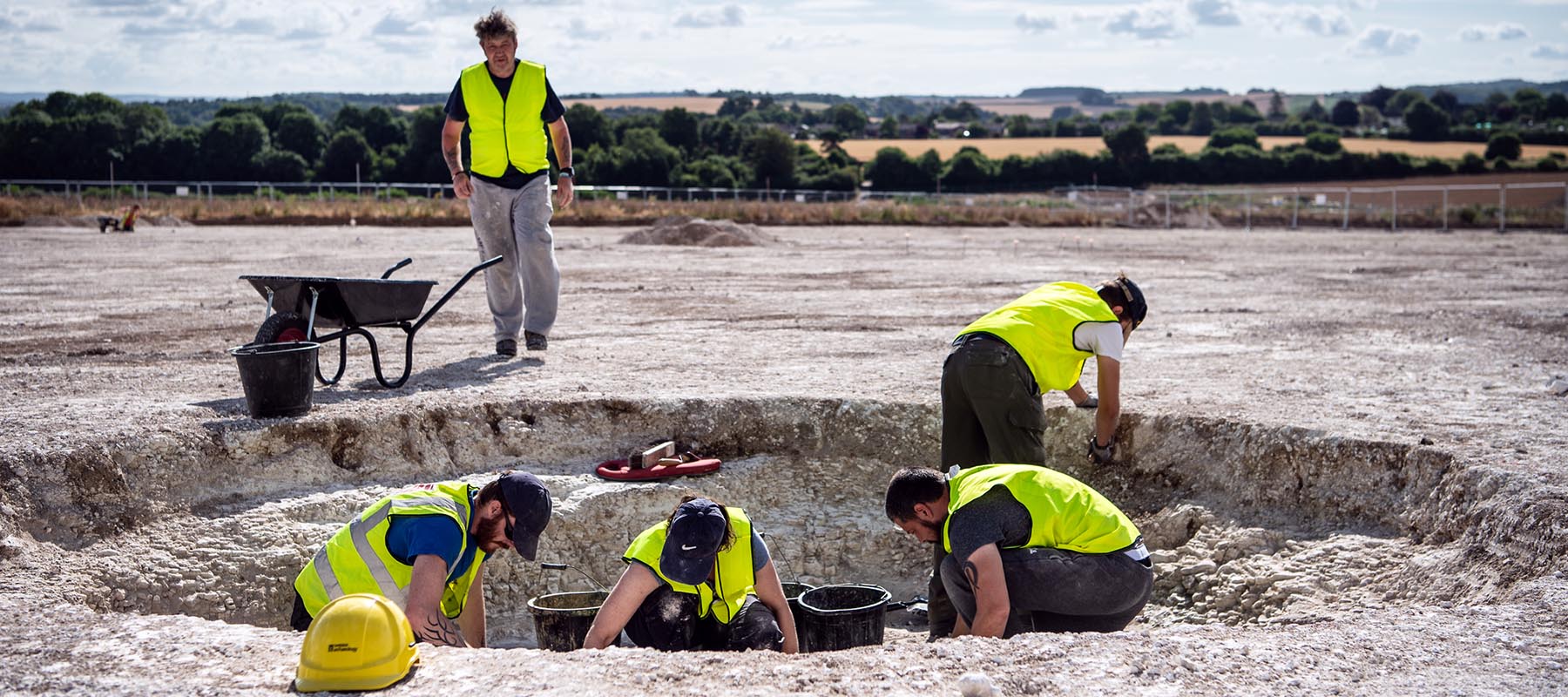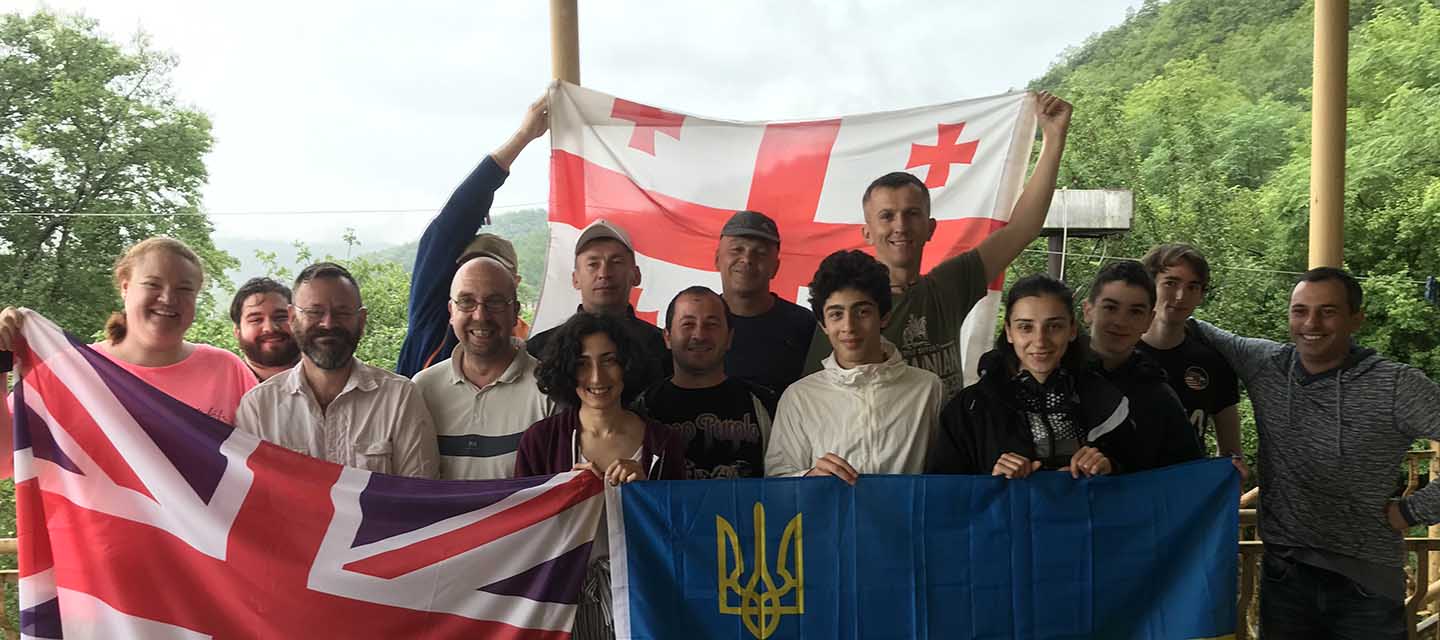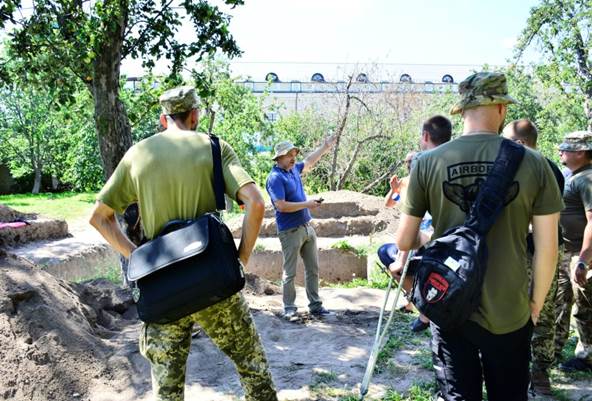
A University of Winchester academic’s work on the therapeutic potential of archaeology is making an impact in Ukraine where it being used to help soldiers and civilians traumatised by their experiences in the war with Russia.
Dr Paul Everill is due to speak online this month to the Ukrainian Association of Archaeologists (UAA) about his experiences working with veterans at the site of a Byzantine fortress at Nokalakevi in Georgia, and leading the fee-waiver studentships in archaeology for veterans at the University of Winchester.
As well as his work with service veterans in Georgia and the UK, alongside programmes like Operation Nightingale and Breaking Ground Heritage, Paul was one of the co-founders of the AMPHORA Project which developed toolkits for people running or taking part in archaeological projects aiming to deliver public mental health and wellbeing benefits.

Dr Paul Everill (second left of front row) with participants in the Nokalakevi dig in Georgia
AMPHORA, developed with Dr Karen Burnell, Associate Professor of Applied Psychology at Southampton Solent University, was prompted by the growth in the number of people participating in digs and other heritage projects as a way to improve mental health.
The AMPHORA guidelines have been taken up by a Ukrainian initiative, based at the historical monastery of the Kyiv-Pechersk Lavra National Reserve, called "Spiritual Recovery Through Culture", which uses archaeology as well as heritage crafts to help improve the wellbeing of Ukrainian military personnel.
Last summer Paul learned of AMPHORA’s impact in Ukraine when he met the project leader, Dr Sergiy Taranenko, at a conference held at Bournemouth University on the theme of 'Archaeology for Recovery'. The conference was co-organised by Professor Mark Brisbane, who has established a fundraising campaign to support Dr Taranenko’s work, and Richard Osgood of Operation Nightingale.
Paul said: “It was wonderful to hear that the AMPHORA guidelines had supported the development of this initiative in Kyiv, and obviously Karen and I talked to Sergiy and his colleagues later that day. Since then we’ve been offering advice, and helping in whatever ways we can, including in the evaluation of their results. It’s a huge privilege to work with colleagues in Ukraine, and to support this important work.”

The Spritual Recovery through Culture programme in Ukraine
More recently, Dr Taranenko has worked with the Ukrainian Association of Archaeologists to develop a hugely expanded nation-wide scheme, based on his work at the Kyiv-Pechersk Lavra National Reserve and supported by the AMPHORA guidelines.
Paul and Karen plan to work with Dr Taranenko and his colleagues to develop a bespoke ‘AMPHORA-Ukraine’ toolkit for the UAA.
Dr Taranenko said: “After the successful use of the AMPHORA program in the Kyiv-Pechersk Lavra National Reserve during 2023-24, I decided to spread relevant information throughout Ukraine. This was helped by colleagues from the UAA, which has 26 branches throughout the country, and begins with a seminar series of five lectures.
“The success of this project is largely due to my British colleagues who promptly responded to my request. Together with Karen and Paul, we plan to create a methodological manual "AMPHORA-Ukraine", which will help in the rehabilitation of the Armed Forces of Ukraine for many years."
On the world stage
Paul has also been asked to convene a conference session on 'Wellbeing Archaeology' for the World Archaeological Congress in June. This session seeks to expand the global conversation on the subject, exploring and sharing experiences in this emerging field. It is hoped that this will help us better understand the global potential of this work in terms of enhancing public benefit, and the role that AMPHORA might play in informing and developing policy.
Back to media centre